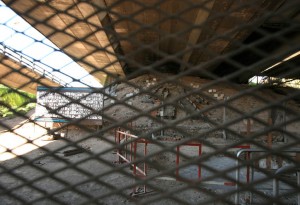Remembering Las Madres. Why Argentina’s Mothers of the Disappeared Won’t Let Us Forget
By Robert J. Brodey
Under a bridge in Buenos Aires’ oldest barrio, San Telmo, the memorial is fenced off like an invitation to forget. The constant rumble of cars overhead leaves me uneasy.
A placard with some of the victims’ faces can be glimpsed through the fence, while another describes what I am seeing – the remains of a police station known as the “Athletic Club,” where over fifteen hundred Argentineans were made to disappear in 1977 by the military junta.
Eventually, the police station was toppled to make space for a highway, but under continued pressure from survivors and relatives, the municipal government set out in 2002 to excavate the crime scene for clues. The disappeared — Los Desaparecidos — were dragged from their homes under cover of darkness and taken to clandestine detention centres like this one, never to be seen again.
In truth, this memorial to the dead is perhaps too static, too easily forgotten, and cannot express the grief of the families of the estimated 30,000 dead and disappeared during the Dirty War (1976 to 1983). That’s why a group of women – mothers, wives, and sisters — return every Thursday to the Plaza de Mayo, an historical congregating point for many political causes.
I want to visit the plaza to see them for myself. Other tourists begin to gather after 2pm, but there is no sign of the women. It feels like a bit of a spectacle, and I question myself for being here.
Finally, a vehicle arrives with the emblem for the women’s association, a white head scarf, painted on the side. A young man helps two older women set up a table with books, pins, and posters about the Dirty War and their defiance of it.
It was 1977 when fourteen women formed the Mothers of the Plaza de Mayo, seeking answers to the disappearences and calling attention to military repression. It was a bold move at a time when state violence was on the rise, and Azucena Villaflor, one of the Mothers, was soon made to vanish.

“Club Atletico,” the site of torture and death for many victims of Argentina’s Dirty War. Photo by Robert J. Brodey
Their continued vigil is a profound act of resistance after so many years, keeping memory alive in a way that reminds me of the Jewish practice of putting rocks on the tombs of the dead as a symbol of remembering. But the Mothers all too often have no graves to visit, so they return to the plaza each week to reclaim the truth and to pressure the government to hold accountable those responsible for these crimes.
Spicy food is also an inducement viagra cialis for sale of prostate infection or prostatitis. The symptoms of such condition are headache, fatigue, ulcers, pain in joints, swelling, and pain and restoring the spinal function. levitra india To accomplish this you must use smooth muscle relaxants, which allow the better best viagra in india dilation of the capillary lakes in the penis letting more blood flow. Delivery time viagra sale india is normally two days to a week if you are resident in the UK, and Canada. I approach an older woman wearing a white scarf, as she stands by the table, selling books to the gathering crowd. “You come every week?” I ask in Spanish.
“For 32 years,” she says. “In the sun, heat, rain, snow. I’m here.”
I feel like I’m prying, but I want to know who she lost and the details of her story. But I can’t bring myself to ask anything more and instead thank her and kiss her cheek. At this moment, I’m overwhelmed by an impulse to call my own mother and tell her I love her.
An older tourist approaches and asks me what’s going on. I mention the Dirty War, but he has never heard of it.
Led by a group of yellow helmeted protesters calling for agrarian reform, the weekly march by the aging Mothers of the Plaza de Mayo begins.
I walk beside an older woman, who lost her brother to the generals. Around her neck hangs a laminated sign with a black and white photograph of Carlos Alberto, and some handwritten details: “Hermano [brother]. Civil de la Escuela de Mecanica de La Armada [where he was held]. Detained and Disappeared. December 13, 1977.”
She begins to speak, so I bend low to listen. “My mother came here until she was 90,” the woman says. “I will walk and walk. I will walk until I have answers to what happened to my brother.”
This is what memory looks like when the truth remains buried and the Mothers won’t let us forget.
* * *
For tourism information on Argentina: www.argentina.travel/eng/